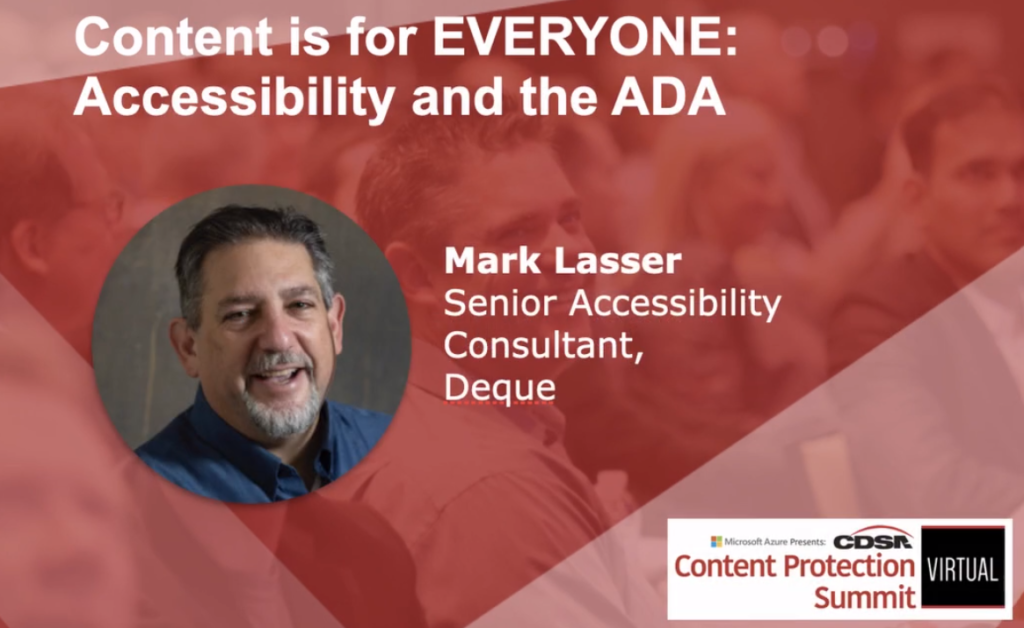M+E Daily

Deque: Providing Accessibility Offers Companies Multiple Advantages
Story Highlights
It is in the best interest of all media and entertainment companies to be compliant with the Americans with Disabilities Act (ADA), according to Mark Lasser, senior accessibility consultant at Deque.
“We’re talking about this because I think there’s a play [here] for content delivery for both consumers and within an organization, and also there are some security concerns that can be discussed as well,” he said during the Dec. 8 virtual Content Protection Summit.
“Twenty-six percent of Americans have a disability,” he pointed out during the DLP, Accessibility & Framework session “Content is for EVERYONE: Accessibility and the ADA.”
That translates to about 61 million people, he said, referring to recent Centers for Disease Control and Prevention (CDC) data. About 13.7% of them have a mobility problem, while 10.8% have a cognition issue, 6.8% have difficulty living independently, 5.9% have a hearing issue, 4.6% have a sight issue and 3.7% can’t care for themselves on a daily basis, according to the data.
Noting that he’s been blind about six years, Lasser said the numbers don’t add up to 26% because there is a “decent amount of overlap” among disabilities. Many of them are invisible, he said, pointing out he’s had people tell him he doesn’t sound blind, as crazy as that might sound.
 However, “accessibility is a huge marketing opportunity” for companies, he said. The total after-tax disposable income for working-age people with disabilities is approximately $490 billion, he said, referring to 2018 data. In comparison, he noted that African American have after-tax disposable income of $501 billion and Hispanics $582 billion. There are, meanwhile, 20 million U.S. working age adults, age 16-64, he added.
However, “accessibility is a huge marketing opportunity” for companies, he said. The total after-tax disposable income for working-age people with disabilities is approximately $490 billion, he said, referring to 2018 data. In comparison, he noted that African American have after-tax disposable income of $501 billion and Hispanics $582 billion. There are, meanwhile, 20 million U.S. working age adults, age 16-64, he added.
You want security to not lock out people from your services just because they have a disability, he said. Besides, accessibility is also the law, he noted, pointing to ADA and other laws. In 2018, digital accessibility lawsuits soared 181% and, in 2019, they remained at the same rate of 1 every hour, he said.
In addition, the cost of reactive accessibility testing is significant, he noted, pointing to IBM data showing the costs of discovering defects after release of a product are significant – up to 30 times higher than if you catch them in the design and architectural phase. And false positives may increase costs a whopping 386%, he added.
Deque’s automated accessibility tools can reduce an organization’s cost of maintaining accessibility compliance by 90%, he said. Its axe extension has become the global standard in accessibility testing, he noted, adding there have been more than 100 million core downloads of axe to date. There are also 120,000 active weekly Chrome extension users, he said. Free consultation is also offered.
During the Q&A, he said that after the COVID-10 pandemic started, “at first, there was a pushback to try to get extensions from [Deque] because of concerns in the school setting [but] that was kind of quashed.”
Meanwhile, the ADA “is in full effect and, COVID, if anything, has increased the questions,” he said, explaining: “It increased the amount of legal challenges that people with disabilities have brought forward. So [it’s] not slowing down. If anything, [COVID is] probably accelerating the compliance and complaints and fortunately also increasing innovation from technology providers at the same time. So we’re seeing a lot of good things there.”
Asked if there is a budget increase or decrease from becoming ADA compliant, he said: “It’s the wrong question to ask…. There’s going to be some level of increased cost in development and designing but the cost is saved later” in legal fees and remediation – “and you’re increasing your market share by a group of people that’s pretty much as large as most any other market segment that you’d be going after…. You want those people. You want to capture those dollars. You want to avoid those legal fees. So there is a bit of money increase. It depends on the size and scope of the work that you’re doing and the complexity of course. But it tends to pay dividends down the line by increased revenues and decreased litigation and liabilities.”
When it comes to diversity, equity and inclusion issues, “the number of people that have disabilities that aren’t working is sort of horrific,” he went on to say, explaining: “Within the blind and the deaf communities, it’s 70 percent and yet you’ve got folks like myself and some of my colleagues who are blind or have other major disabilities but we have master’s degrees and we work in computer science, and you’ve got people with disabilities working at NASA and at the CIA – all over the place. The entertainment industry is probably a little bit farther behind and hopefully we can do something to move that forward.”
To view the full presentation, click here. To view the presentation slide deck, click here.
Presented by Microsoft Azure, the Content Protection Summit was sponsored by SHIFT, Genpact, Akamai, Convergent Risks, Friend MTS, GeoGuard, PacketFabric, Palo Alto Networks, Richey May Technology Solutions, Splunk, Zixi, EIDR, Cyberhaven and Xcapism Learning.
The event was produced by MESA, CDSA, the Hollywood IT Society (HITS) and Women in Technology Hollywood (WiTH), under the direction of the CDSA Board of Directors and content advisors representing Amazon Studios, Adobe, Paramount, BBC Studios, NBCUniversal, Lionsgate, WarnerMedia, Amblin Entertainment, Legendary Pictures, and Lego Group.









